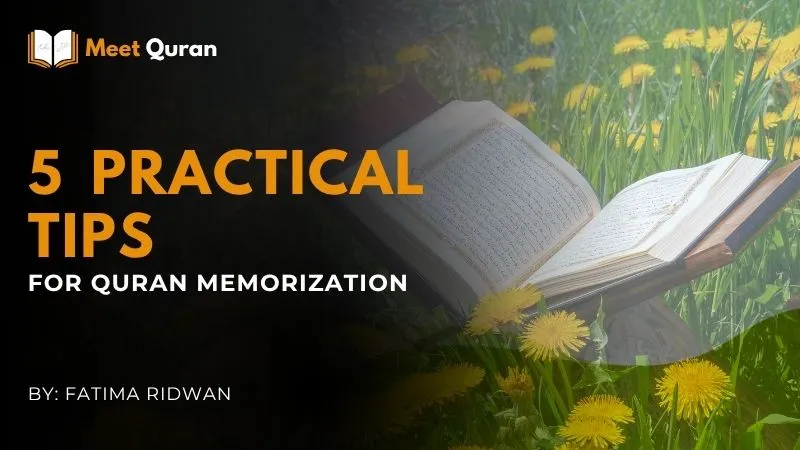"And We have certainly made the Qur'an easy for remembrance, so is there any who will remember?" - Quran 54:17
I still remember the day I decided to start memorizing the Quran. Sitting in my local mosque after Friday prayers, listening to a young hafiz recite with such beauty and confidence, I felt both inspired and overwhelmed. "I could never do that," I thought. "I'm too old, it's too difficult, and where would I even begin?"
If you've had similar thoughts, you're not alone. Many Muslims dream of memorizing Allah's words but feel paralyzed by the enormity of the task. The truth is, starting your Hifz journey doesn't require superhuman memory or years of Islamic study – it just requires the right approach and sincere intention.
Why Should You Memorize the Quran?
The Prophet Muhammad (peace be upon him) said, "The best of you are those who learn the Qur'an and teach it" (Sahih al-Bukhari). Beyond this tremendous spiritual reward, memorizing the Quran transforms your relationship with Islam in profound ways.
When you carry Allah's words in your heart, your prayers become more meaningful. You'll find yourself reflecting on verses throughout the day, and gradually, your understanding of Arabic will deepen. Many huffaz (those who have memorized the Quran) describe feeling a sense of inner peace and spiritual grounding that comes from this intimate connection with Allah's revelation.
Remember, Allah Himself promises that the Quran is made easy for remembrance. If He has made this promise, then success is possible for every sincere believer.
Essential Preparations: Setting Yourself Up for Success
Make Your Intention Pure
Before you memorize a single verse, examine your heart. Are you doing this to show off to others? For worldly gain? Or purely to please Allah and grow closer to Him? The scholars say that actions are judged by intentions, so start with a clean, sincere niyyah.
Choose Your Mushaf Wisely
This might sound trivial, but it's crucial: stick to one copy of the Quran throughout your entire journey. I learned this the hard way when I switched between different editions and found myself confused by varying layouts.
Most teachers recommend the 15-line Madani Mushaf because of its clear script and consistent formatting. Your eyes will eventually memorize the visual placement of verses on the page, which becomes a powerful memory aid.
Assess Your Starting Point
Can you read Arabic fluently? Do you know basic Tajweed rules? If you're struggling with pronunciation, pause your memorization plans and focus on reading skills first. As my teacher always said, "You can't memorize what you can't properly read."
Find the Right Guide
While some people successfully memorize independently, having a qualified teacher makes an enormous difference. They'll correct your mistakes before they become habits, keep you motivated during difficult periods, and provide structured guidance.
Look for someone with proper Ijazah (certification) who demonstrates patience and understanding. With online Quran memorization platforms becoming increasingly popular, you have access to qualified teachers worldwide – geography is no longer a barrier.
Your Step-by-Step Memorization Method
Step 1: Start Small, Dream Big
Here's where most beginners go wrong: they aim too high too quickly. Start with Al-Fatiha if you haven't memorized it already, then move to the shorter surahs like Al-Ikhlas, Al-Falaq, and An-Nas.
These surahs are familiar from daily prayers, relatively short, and will give you the confidence boost you need. Aim for 2-3 verses daily – it might seem slow, but consistency beats intensity every time.
Step 2: The Five-Part Process
I've tried various Quran memorization techniques over the years, but this approach consistently works:
| Step | Action | Duration | Focus |
|---|---|---|---|
| 1. Listen actively | Play the recitation while following in Mushaf | 5-10 times | Proper pronunciation |
| 2. Read aloud | Recite the verse slowly and clearly | 3-5 times | Accuracy and flow |
| 3. Break it down | Memorize phrase by phrase | As needed | Small manageable chunks |
| 4. Close the book | Recite from memory | Until confident | Independent recall |
| 5. Verify and repeat | Check accuracy and strengthen memory | 5-10 times | Error correction |
Step 3: Create Your Sacred Routine
The scholars of the past would wake before dawn to memorize, when their minds were fresh and the world was quiet. While you don't need to replicate their exact schedule, consistency is non-negotiable.
Choose a specific time – whether after Fajr, before Maghrib, or during your lunch break – and guard it jealously. Twenty to thirty minutes daily is far better than sporadic three-hour sessions.
| Time Slot | Benefits | Best For |
|---|---|---|
| After Fajr | Fresh mind, quiet environment | New memorization |
| Before Maghrib | Day's fatigue helps focus | Review and revision |
| After Isha | Peaceful, reflective time | Light review before sleep |
Step 4: Master the Art of Revision
Here's the secret sauce: spend 70% of your time reviewing and only 30% learning new material. Every huffaz will tell you that revision is where the real work happens.
Review yesterday's verses before starting anything new. Dedicate one day weekly to reviewing everything you've memorized. This might feel slow initially, but you're building a foundation that will last a lifetime.
"The example of the one who recites the Quran is like the owner of camels. If he keeps them tied, he will keep them, but if he releases them, they will go away."
Avoid These Common Beginner Traps
I've seen enthusiastic beginners make the same mistakes repeatedly. Don't be the person who memorizes Quran verses in one day only to forget them by the next week. Rushing leads to frustration and eventual abandonment.
| Common Mistake | Why It Happens | Better Approach |
|---|---|---|
| Taking on too much | Initial enthusiasm | Start with 2-3 verses daily maximum |
| Inconsistent practice | Lack of routine | Fixed daily schedule, same time |
| Neglecting revision | Focus only on new content | 70% review, 30% new memorization |
| Perfectionism paralysis | Waiting for ideal conditions | Start where you are, with what you have |
Similarly, don't wait for perfect conditions. You don't need a soundproof room, the most expensive Mushaf, or hours of free time. Start where you are, with what you have.
Most importantly, resist the urge to compare your progress with others. Your friend's eight-year-old might be memorizing faster than you, but everyone's journey is unique. Allah judges hearts, not speed.
Practical Tips That Actually Work
Create a dedicated space for memorization, even if it's just a corner of your room. Use multiple senses – read, listen, and even write verses occasionally. Stay hydrated and maintain good physical health; your brain needs optimal conditions to form strong memories.
| Tip Category | Specific Action | Why It Works |
|---|---|---|
| Environment | Same place, minimal distractions | Creates mental association |
| Multi-sensory | Read, listen, write | Strengthens neural pathways |
| Physical wellness | Stay hydrated, get enough sleep | Optimal brain function |
| Spiritual connection | Make dua, understand meanings | Emotional attachment aids memory |
Make dua regularly, asking Allah to grant you ease and success. Keep a simple journal tracking your progress – seeing how far you've come provides powerful motivation during challenging periods.
Most importantly, be patient with yourself. Building memory is like building muscle – it takes time, consistency, and gradual progression.
Your Journey Starts Today
Every hafiz started exactly where you are now. The young boy whose Quran recitation inspired me had once struggled with his first verses too. The difference between dreamers and achievers isn't talent or age – it's the willingness to begin.
Allah has promised that He made the Quran easy for remembrance. Trust in that promise, take the first step, and start today with Al-Fatiha if you haven't already. Your future self will thank you for the courage you show today.
Remember, this journey isn't just about memorization – it's about transformation. With each verse you commit to memory, you're building a closer relationship with your Creator and carrying His guidance wherever you go.
وَلَقَدْ يَسَّرْنَا الْقُرْآنَ لِلذِّكْرِ فَهَلْ مِن مُّدَّكِرٍ
May Allah grant you success in this blessed endeavor and make His words a source of light in your heart and life.
Ready to begin? Set aside 20 minutes today, choose your Mushaf, and start with the opening chapter. Your Hifz journey awaits. At Meet Quran, our experienced instructors can guide you through personalized online Quran memorization programs. Book your free consultation today and take the first step toward becoming a guardian of Allah's words.





Comments (0)